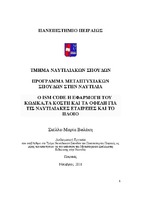Ο ISM Code η εφαρμογή του κώδικα, τα κόστη και τα οφέλη για τις ναυτιλιακές εταιρείες και το πλοίο

Προβολή/
Λέξεις κλειδιά
ISM Code ; Ναυτιλία -- Μέτρα ασφαλείας ; Ναυτιλία -- Δίκαιο και νομοθεσία ; Θαλάσσιες μεταφορές -- Μέτρα ασφαλείας ; Ναυτιλιακές εταιρείεςΠερίληψη
Η παρούσα εργασία, πραγματεύεται μια ανάλυση του υποχρεωτικού Διεθνούς Κώδικα Ασφαλούς Διαχείρισης (International Safety Management Code ISM CODE). Ειδικότερα θα αναλυθεί το πεδίο του ρυθμιστικού πλαισίου το οποίο καλύπτει, το πως εφαρμόζεται από τις ναυτιλιακές εταιρείες, καθώς και το κόστος αλλά και τα οφέλη από την εφαρμογή του.
Ο Διεθνής Ναυτιλιακός Οργανισμός (ΙΜΟ, International Maritime Organization), ο οποίος ως πολυεθνικός, διακυβερνητικός Διεθνής Ναυτιλιακός Οργανισμός, επιβλέπει την σωστή και ασφαλή επικοινωνία και συνεργασία μεταξύ των κρατών-μελών του στον τομέα της ναυσιπλοΐας υιοθέτησε τον ISM CODE με σκοπό να θεσμοθετήσει και παράλληλα να προωθήσει την εμπέδωση της έννοιας της κουλτούρας και της παιδείας, σε ζητήματα ασφάλειας από τις ναυτιλιακές εταιρείες.
Στα πλαίσια αυτά, θα αναλυθεί τι ακριβώς είναι ο ISM CODE, τι καλύπτει, πώς αντιλαμβάνεται τα θέματα ασφάλειας και πώς εκπαιδεύει πάνω στα θέματα αυτά, ποιοι είναι οι βασικοί στόχοι του και ποια τα μέσα και τα εργαλεία τα οποία μετέρχεται για την επίτευξη αυτών των στόχων.
Αναμφίβολα, ο ISM CODE αποτελεί παγκοσμίως ένα σημαντικό μέτρο μείζονος σημασίας για την ασφάλεια στη θάλασσα και την αντιμετώπιση των ναυτικών ατυχημάτων. Πρόκειται για ένα ρυθμιστικό κείμενο κανόνων του οποίου η εφαρμογή, διαδραματίζει καίριο ρόλο στην ανάπτυξη, υλοποίηση και εφαρμογή πολιτικών για την ασφάλεια στη θάλασσα. Δεν είναι δύσκολο να συνειδητοποιήσει κανείς ότι είναι επιτακτική ανάγκη, να αναπτύσσονται πολιτικές, στον τομέα της ασφάλειας και να διατυπώνονται κανονιστικά κείμενα τα οποία θα συμβάλλουν στην αποτελεσματική πρόληψη ζητημάτων που άπτονται της ασφάλειας στη θάλασσα και τη διαφύλαξη της προστασίας του περιβάλλοντος.
Ο Διεθνής Κώδικας Ασφαλούς Διαχείρισης, είναι αναγνωρισμένος διεθνώς σήμερα, ως ένα από τα εργαλεία για την αναβάθμιση της ασφάλειας των πλοίων που πιστοποιούνται σύμφωνα μ’ αυτόν και είναι ένας από τους βασικούς πυλώνες για τη
λεγόμενη «ποιοτική ναυτιλία». Σε έναν ευνομούμενο σύγχρονο κόσμο, το θαλάσσιο εμπόριο δεν μπορεί σε καμία περίπτωση να υφίσταται και να λειτουργεί χωρίς συγκεκριμένους κανόνες ασφάλειας. Συνεπώς, όλοι οι εμπλεκόμενοι στη θαλάσσια βιομηχανία θα πρέπει να διαχειριστούν με εξαιρετική ευθύνη την απαιτούμενη ισορροπία μεταξύ ασφάλειας και εμπορίου, μέσα από τις προδιαγραφές, πρακτικές, υποδείξεις, και εν γένει όλα τα μέτρα τα οποία υποδεικνύει, υποχρεώνει και ενθαρρύνει ο Διεθνής Κώδικας Ασφαλούς Διαχείρισης
ISM, για την ασφάλεια στη θάλασσα.


